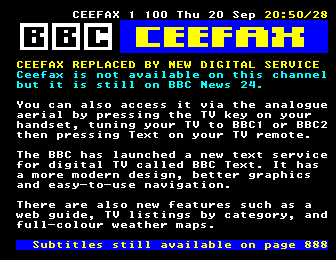A number of people asked me the same question today: “How do you feel about the Ceefax signal finally being switched off?”
A far greater number of students on this course will probably not even understand that question.
BBC Ceefax was the internet before the internet – the world’s first on-demand news and sports information service, all available via your television remote control 24 hours a day, 365 days a year.
Launched in 1974, it eventually became a national institution used by millions of people, often several times a day, from the Prime Minister down to ardent fans of the lowliest football clubs.
In a one-hour television special on BBC Northern Ireland tonight, the analogue Ceefax service was finally put to rest as the corporation completed its switch to digital services only.
I’m proud to say Ceefax was also the place where I spent a large part of my career.
It was my first job at the BBC and my ticket to 10-hour shifts updating latest scores listed on page 302 and so much more, walking the hallowed corridors of Television Centre during breaks, barely believing I was paid to be there.
Becoming Sports Editor in 1997 remains one of my career highlights. Knowing football supporters across the country were relying on our output to know exactly what was going on at any given moment during a busy Saturday afternoon was such a buzz.
Ceefax broadcasted instant transfer and latest goal news to so many people long before the days of Jeff Stelling, the web and BBC Radio 5 Live.
When Glenn Hoddle was about to be sacked as England manager his 13-year-old daughter Zara faxed Ceefax Sport to make a last-ditch plea to save his job. I can still remember the shock at seeing this become part of the top story on the BBC’s Six O’ Clock News within an hour.
However, it’s also easy to recall the sheer terror of a little typo that turns a ‘30-yard shot’ into something very different when the ‘o’ is replaced by the letter ‘i’.
And I’ll bet former Wales manager Bobby Gould still savours the time he managed to reach me at home in the middle of the night to complain about Ceefax describing his team as ‘lacklustre’ after they lost against Italy.
Happy days indeed.
When I left Ceefax to help launch the BBC Sport website in 2000, I honestly didn’t expect the signal to last another 12 years in the digital age and I thought the end of its transmission had long since passed.
Having no idea Ceefax was still live until yesterday, I was amazed when my mum asked me tonight: “But what am I going to do without page 302?”
Well, there’s always the internet.
But Ceefax is no more.

